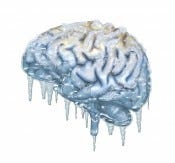Hypothermia might harm, not help, in bacterial meningitis

Hypothermia No Help for Bacterial Meningitis
Therapeutic hypothermia got "hot" after trials in the early 2000's showed improvement in neurological outcomes in global cerebral hypoxia after cardiac arrest. (Any benefit of targeted temperature management below 36° Celsius is in serious doubt after a much larger randomized trial contradicted those earlier, smaller trials, showing no benefit of hypothermia after cardiac arrest of any rhythm.) While data supporting therapeutic hypothermia for trauma patients is not robust, it has been demonstrated to lower intracranial pressure. This made it appealing as a possible adjunctive treatment for bacterial meningitis, which despite advances in so many areas of critical illness, continues to have high mortality. In one small cohort of 10 patients with bacterial meningitis, 80% had a favorable in bacterial meningitis with the institution of therapeutic hypothermia. To further evaluate the effects of cooling patients with bacterial meningitis, Mourvillier and colleagues conducted a randomized trial, published in JAMA.
What They Did
Comatose (GCS 8 or less) adults with confirmed bacterial meningitis were randomized to receive 4o° C saline bolus and cooled to 32-34° C for 48 hours or usual care in an open-label randomized trial in 49 ICU's in France. Antibiotic administration was standardized and rewarming was passive.
Primary outcome was Glascow Outcome Scale score at 3 months, with favorable outcome being a score of 5 and unfavorable scores 1-4. There were several secondary endpoints, one of which was 3 month mortality. Interim analyses were planned after 106, 212 and 318 patients were enrolled given the rare incidence of severe meningitis, with prespecified boundaries in the primary outcome allowing termination. Additionally, the data and safety monitoring board (DSMB) asked to review severe adverse events for each set of 50 patients enrolled, given this would be a new indication for therapeutic hypothermia.
What They Found
The safety monitoring board stopped the trial after randomization of 100 patients (98 included in analysis) because of higher mortality at 3 months in the hypothermia group (51% vs 31%, RR 1.99, 95% CI 1.05-3.77, p=0.04), given the low probability of demonstrating superiority to the hypothermia group if continued to completion. The primary outcome was also not met, with both groups having high rates of unfavorable outcomes (86% in hypothermia vs 73% in control, p=.13) The baseline characteristics of the groups were similar (GCS, SAPS II score, causal bacterial agent, etc) though there was a trend toward more septic shock in the hypothermia group (37%vs 20%, p=0.18). In a multivariate Cox proportional analysis controlled for variables selected a priori, including age, GCS at inclusion and septic shock, the increased mortality in the hypothermia group lost its statistical significance, but remained higher (HR 1.76, 95% CI .89-3.45, p=.10). Several types of cooling were used across the different centers, but there was no difference in unfavorable outcome or mortality based on the method of cooling or if pneumococcus was the cause of the meningitis.
What It Means
While stopping the trial early may have exaggerated the (negative) treatment effects, the results of this trial suggest hypothermia is extremely unlikely to benefit patients with severe bacterial meningitis. On the heels of the largest trial yet in cardiac arrest patients showing no benefit from cooling below 36° C, the results from this trial should cause providers to be lukewarm on the use of targeted temperature management below 36° for any indication, for now. Further study in arenas such as severe sepsis or septic shock will certainly require additional rumination about target patient populations, mechanisms of potential benefit and trial design. A tiny study (n=20) testing therapeutic hypothermia in septic shock was completed in 2005, but its results haven't been published. Hypothermia is also being tested as an adjunctive treatment for stroke, ST-elevation myocardial infarction, and status epilepticus. Mourvillier, B et al. Induced Hypothermia in Severe Bacterial Meningitis: A Randomized Clinical Trial. JAMA 2013;310(20):2174-2183.


